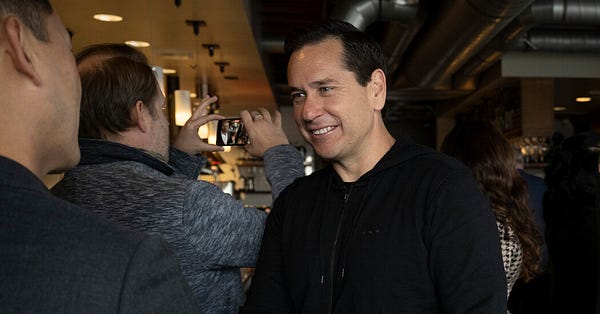Destabilized Saturday Edition #44
"Democracy may be winning", climate disasters and the decline of retiring on the coast, the world's largest diasporas, how do you like them apples!?
Given my interest in the housing-related risks of living in climate vulnerable places, a New York Times article a friend sent me this week called “‘Do You Really Want to Rebuild at 80?’ Rethinking Where to Retire.” caught my eye.
“We loved living along the coast, but we knew that life there was not sustainable for us in our old age,” Melissa Hoagland said.
…A small but growing number of older people like the Hoaglands are taking climate change into account when choosing a retirement destination, real estate agents and other experts say. Armed with climate studies, many retirees are looking for communities that are less likely to experience extreme weather events, such as wildfires, drought and flooding.
Because climate-fueled extreme weather events are harder on older people who are more likely to have serious medical conditions, this trend may particularly hurt regions that have traditionally attracted retirees.
“It seems like Northeast retirees were looking at retirement differently,” Dr. Keys said. “On one hand, you have a strong demographic pull of baby boomers who are looking for warmer climate, and on the other hand, there is a newfound appreciation of climate risks.”
…Three-quarters of residents who died in the 2018 Camp Fire, which destroyed the Northern California community of Paradise, were 65 and older. Well over half of the record-high 323 people who died from heat-related causes in Arizona’s Maricopa County in 2020 were at least 50. And two-thirds of the people who died in Florida during Hurricane Ian in September were 60 and older.
Frailty and cognitive impairments make it difficult for older people to evacuate and prepare their homes for disasters. Older people are also more likely than younger people to die from heat stroke. Extreme heat and wildfire smoke can worsen diabetes, heart disease and lung conditions.
Housing markets rise and decline based on the supply of and demand for homes. A decrease in incoming buyers can have the same effect on home values as an increase in the supply of homes driven by people moving away. In other words, new people choosing not to move in has the same effect as people leaving. As I wrote in September (before both Hurricane Ian and Hurricane Nicole):
Returning to our thought experiment, if the housing market where you live were going to collapse – say prices fall by at least 60 percent – 50 years from now, how long would you wait before selling your home to avoid losing the equity you’ve built? What if the housing collapse were going to happen in 20 years? 8 years? 2 years?
How long do you think other people would wait before selling their homes? How might their calculus affect your approach?
For homeowners in climate vulnerable places, rising extreme weather is a major financial risk. As migration trends shift, reflecting a changing set of desirable qualities in retirement locations, home values will rise in some places and fall in others.
Will this trend remain a story about retirees? Not for too long. The things that are especially unappealing to older people – hurricanes, wildfires, smoke – are unappealing to everyone, and as they worsen more and more people will vote with their down payments.
My Work
American democracy optimism vs. pessimism (link)
So where does this leave us? The results were much better than expected and about as good as we could hope with an unpopular president and the highest inflation in two generations. Does that mean the risks to American democracy have receded and we’re in the clear? Somewhat and no. The risks are less than they were two weeks ago but our democracy still faces serious challenges.
In this strange, liminal moment when it’s hard to get a feel for the currents in American society, I decided to make a pros-and-cons-style list of reasons to be optimistic and reasons to be pessimistic about American democracy in 2022.
Interesting Reads
Why did the media get the midterms so wrong? A short article and a tweet thread offer potential explanations:
Abortion, Democracy and The Bogey of Issue Literalism (link)
Dobbs was not just about whether it was a big deal for you personally whether there are clinics nearby providing abortion care. Even for many not immediately impacted by the ruling, Dobbs was like a punch in the face, like a line being crossed that many people didn’t quite realize was possible, despite the fact that those who had been following the legal evolution knew it was coming. Along with election denialism, Jan 6th-type political violence and related eruptions become potent symbols of a movement focused on taking away rights that many people were stunned to see could be taken away.
—


[It’s worth noting that the press’ “normalcy bias” is a direct outgrowth of it’s bothsides-ism and resulting implicit downplaying of Republicans’ antidemocratic radicalism.]



Tweets of the Week





Extreme Weather Watch
Five-and-a-half feet of snow in Western New York. So much that the Buffalo Bills’ home game on Sunday will be played in Detroit:

Creeping Fascism Watch




Progress Joy and Hope




















